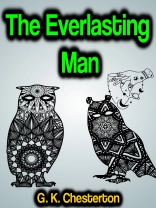The Everlasting Man G. K. Chesterton – ‘The best popular apologetic I know.’ C.S. Lewis In 1925, just three years after his reception into the Catholic Church, G.K. Chesterton published a work that proclaimed anew to the doubters of the age that the key to history had arrived nearly two thousand years before. Contra the evolutionists, he first points to the singular nature of man from his very beginnings; and, later, contra the comparative religionists, points to the uniqueness of Christianity in relation to all other paths. Two of those paths, the way of myth and the way of philosophy, were at war until Christ restored the worlds sanity in the union of Story and Truth. In Chestertons telling, the groaning and travail of the ancient world was answered, precisely and definitively, in the still night of Bethlehem and the Birth of our Lord. Chesterton insists the event be seen with fresh eyes: God as Childa claim no other religion dares to make.As Chesterton writes, when we do make this imaginative effort to see the whole thing from the outside, we find that it really looks like what is traditionally said about it inside. Looking at Christianity with such new-found sight, one can only be astonished at the strangest story in the world. The Everlasting Man is the tale of a unique creature, man, made in the image of God, and of the God-Made-Man who fully reveals this fact to him. There is a spiritual path, and mankind has wandered over it with myriad gaits through the centuries. Nevertheless, the path that leads to mans true home begins with the Nativity and ends with the Resurrection, and in between is contained all life and all holiness.
A propos de l’auteur
Gilbert Keith Chesterton was an English writer, philosopher, lay theologian, and literary and art critic.He was educated at St. Pauls, and went to art school at University College London. In 1900, he was asked to contribute a few magazine articles on art criticism, and went on to become one of the most prolific writers of all time. He wrote a hundred books, contributions to 200 more, hundreds of poems, including the epic Ballad of the White Horse, five plays, five novels, and some two hundred short stories, including a popular series featuring the priest-detective, Father Brown. In spite of his literary accomplishments, he considered himself primarily a journalist. He wrote over 4000 newspaper essays, including 30 years worth of weekly columns for the Illustrated London News, and 13 years of weekly columns for the Daily News. He also edited his own newspaper, G.K.s Weekly.Chesterton was equally at ease with literary and social criticism, history, politics, economics, philosophy, and theology.







![Couverture du Brian Schrag & Julisa Rowe: Community Arts for God's Purposes [Chinese] 貼近神心意的社群藝術 Couverture du Brian Schrag & Julisa Rowe: Community Arts for God's Purposes [Chinese] 貼近神心意的社群藝術](https://static.worldofdigitals.com/thumb_webp/740/9781645083740.webp)




